|
Location:
Between Samur and Blois,
France. |
Grid Reference:
Various |
 The Loire Dolmens:
(Dolmens).
The Loire Dolmens:
(Dolmens).
This group of dolmens is congregated between Samur
to Blois, on the river Loire are some of the most impressive in France. They
are puzzling to archaeologists as none of them appear to have ever been
covered with earth, and there have been no human remains found in them,
which precludes them from having been intended for passage mounds or
funerary structures. (1)
Quick Links:
Several of these
giant dolmens include stones weighing between 50 and 100 tonnes apiece.
The Loire dolmens were constructed with huge granite slabs,
often seen with squared-off edges and corners, the largest chamber at Bagneux is
so big that one has the feeling that one might be entering a temple or meeting
chamber.
|
The Grand Dolmen of Samur: |
Notice:
Privately owned. Entrance fee. Restricted viewing hours.
Location: Saumur, south of the Loire.
The
largest 'dolmen' in France - It has has four massive capstones
each about 2ft thick with the largest estimated 'very accurately by
Vice-Admiral Boyle Summerville to weigh just over 86 tons'.
(1)
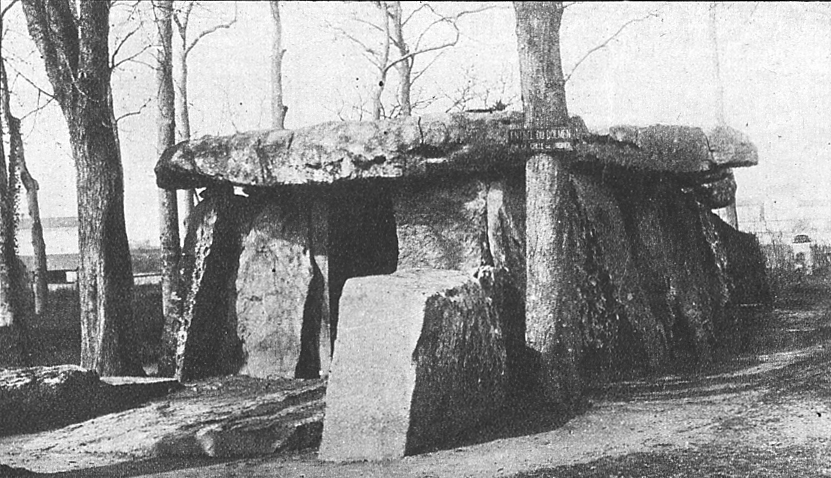
When we consider that
the walls of the dolmen were also made of the same gigantic slabs,
the overall estimate for the amount of stone used at the site
to be around 500+ tons.
A
plaque at the site tells us that the overall length of the dolmen is
23m (75ft), with the internal chamber at over 18m (60ft) in length and
at least 3m high.
There are no carvings or markings present. This site is unlike any
other (remaining) and the specific design suggests a function. As
with the other Saumur dolmens, it was built with large stone slabs,
squared and trimmed in a style particular to this area.
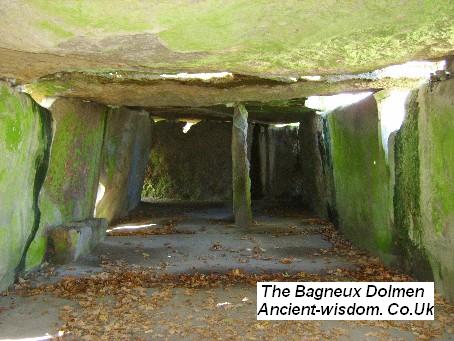
Inside the Dolmen there is a stone bench and a supporting pillar under
one of the capstones.
Although the Dolmen was built next to the Loire, it doesn't face it,
but was orientated with its opening facing east, and may have once
overlooked the distant junction of the Loire/Vienne, although all such
views are now restricted by modern development.
Location:
Along a beaten track, La Fontaine.
This spectacular
'dolmen' is one of the largest in all Europe. Although the capstone
is now broken into four pieces, it is estimated to have
originally weighed in at around 100 tons. This is strictly not a
dolmen, but rather a 'portalled chamber', with a distinct
portalled entrance and several internal supporting stones (under the
cracks in the capstone), which now divide the chamber into smaller
sections. It opens to the south-east, suggesting a possible
orientation towards the winter solstice sunrise.
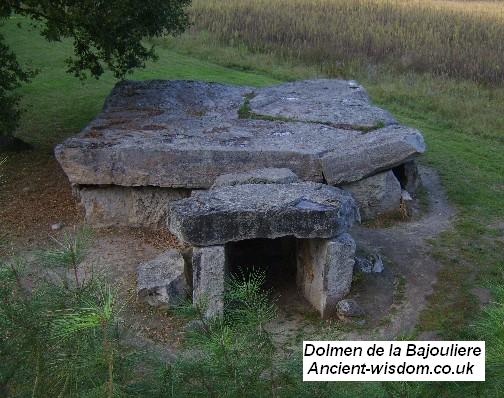
Bajouliere was
constructed in a secluded location with a poor view, making one
wonder what the reason for its location was. The adjacent
rocky outcrop offers a possible explanation for this, which apart
from being a good source of stone, has several interesting features
in the rocks, as the following photos show.
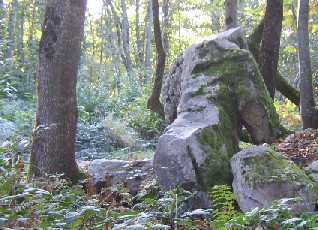
An 'Ape-like' rock in the undergrowth next to
the Dolmen.
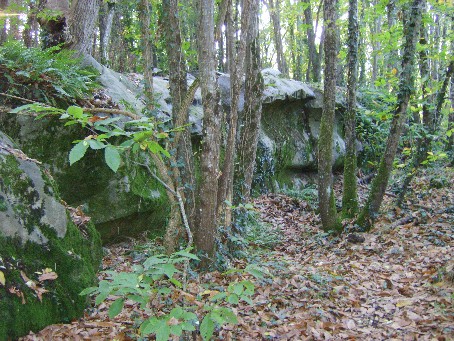
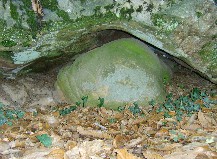
This long
natural granite outcrop runs like a 'vertebrae' for over 20m.
One end has this 'egg-shaped' rock lying under it.
Location:
On the D69 just south-east of Gennes, Nr
Saumur.
This 'Dolmen' is
located on a hill with a good view of the surrounding countryside.
It is approximately 10m long, 4m wide and around 3.5m high.
The structure, when compared with other giant local dolmen, has
less squared stones, and a more 'natural' feel to the shape of the
stones and the way they were put together, suggesting an earlier
construction.
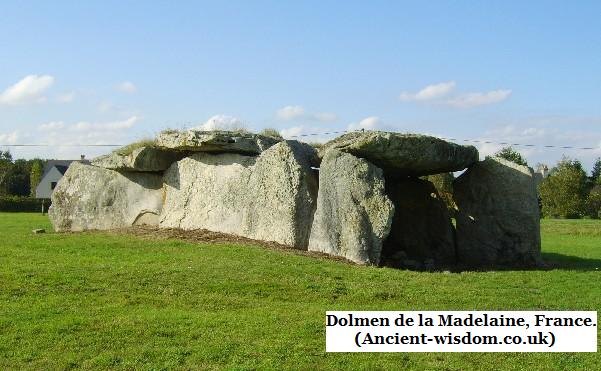
The Dolmen de la Madelaine has a
(Possibly incidental) side entrance at one end and is open-ended at the other. This
design is unlike any other of the Saumur 'dolmens', although the
three cap-stones and overall style, size and 'square-ness' are.
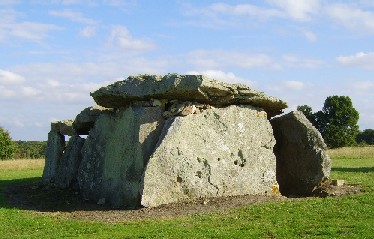 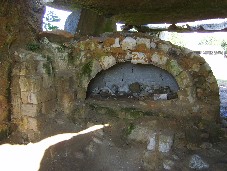 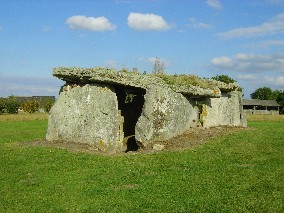
The bread oven in the
picture above is inside the dolmen.
Location:
East of Bauge and
accessible along a track through woodland.
It is constructed in
the same style as the other dolmens of the region, with a portalled entrance and a huge cap-stone which is now broken in
two.
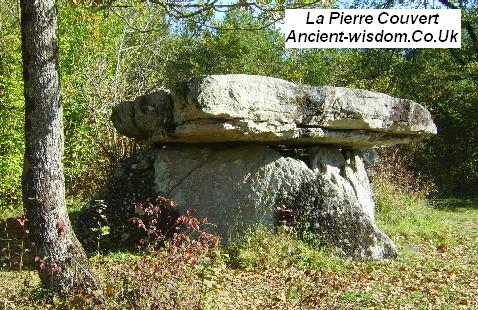
The rounded stone
at the end of this dolmen is reminiscent of that seen at
La Table des Marchands
at Carnac, as is the portalled entrance. The giant lozenge-shaped
capstone is split cleanly in half.
|
Other Dolmens in the Region: |
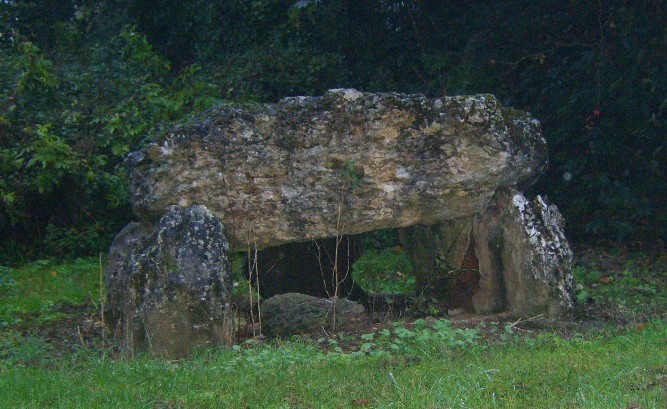 The
smallest dolmen in France? - There are several other
dolmens along this stretch of the Loire, mostly built to the same
scale as those above, but it is ironic that in this very same area
of such giant structures, that the smallest dolmen (That I've
seen) in France can also be found. The
smallest dolmen in France? - There are several other
dolmens along this stretch of the Loire, mostly built to the same
scale as those above, but it is ironic that in this very same area
of such giant structures, that the smallest dolmen (That I've
seen) in France can also be found.
This dolmen lies
east of Landes de Gaulois, near Blois. It stands
under 1m high, and is just over a metre in width and depth. The
similarity in design to its giant neighbours (such as the six
completely unnecessary supporting stones), gives it the appearance
of a 'dwarf' dolmen, or possibly a scale model, anyway the stark
contrast with other structures in the area results in a guaranteed
chuckle for any intrepid hunter.
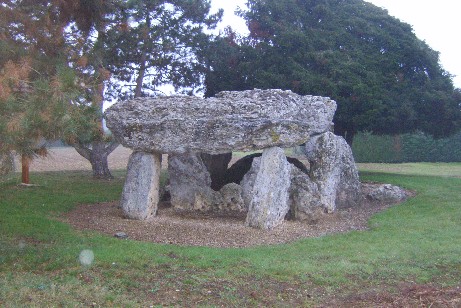 Not
far from this miniature dolmen, is La Pierre Levee, (or
'La Table-du-Diablo' - The Devil's table), which is
constructed in the same style as, but nowhere nearly as grand as
its giant Loire neighbours. It has good visibility, and was made
from noticeably different rock to the ones near Saumur and Tours.
It is dated at around 3,500BC. Not
far from this miniature dolmen, is La Pierre Levee, (or
'La Table-du-Diablo' - The Devil's table), which is
constructed in the same style as, but nowhere nearly as grand as
its giant Loire neighbours. It has good visibility, and was made
from noticeably different rock to the ones near Saumur and Tours.
It is dated at around 3,500BC.
This dolmen lies
on the D957, just north of Blois. The information plaque at the
site identifies another ten dolmens and menhirs in the immediate
vicinity. As with other dolmens in the area, it has a portal
entrance and it is orientated east/west with its entrance facing
the sunrise at the equinoxes.
'Bouche Dolmen'
- This dolmen is located in a farmers field near Bouche. It is
partially collapsed, and has the appearance of having had one or
two of the support stones pulled out from under one side. Before
its collapse, it would have had a portalled entrance, and is
similar in size to La Pierre couvert (above). The capstone
is split in half as at La Pierre couvert, but with squared-off ends.
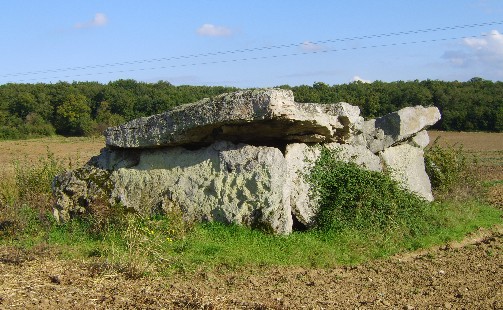
Other dolmens can also be found north of the Loire at Soucelles, La Roche Thibault,
Bauge, Nr Mettray (La Grotte des Fees). South of the river in the
Samur region there are more west of Gennes and in a farmyard near St. Hilaire (Dolmen de la Pierre Boire),
and the massive Le Gros-Chillou at Briancon, Cravant, which is 50
ft (15.2 metres) long and 10 ft (3.1 metres) high.
|
Standing Stones in the Area: |
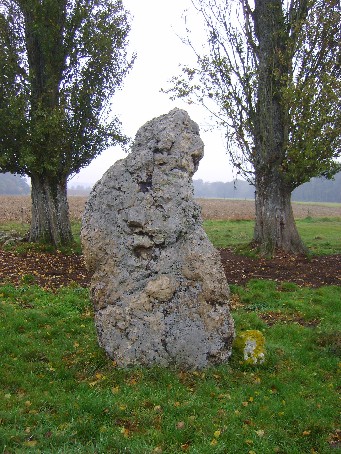
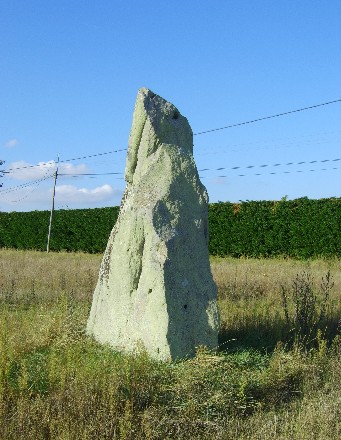
The stone on the left is approx' 2m
high and stands on the D766 between Beamont and Neuille-Pont-Pierre.
The stone on the right is approx' 3m high and stands on the
N751, just outside of Gennes.
(Other
Prehistoric French Sites)
(Dolmens
Homepage)
|